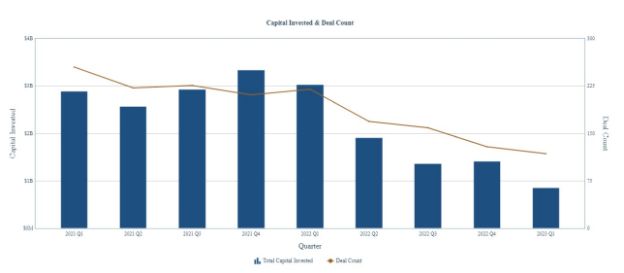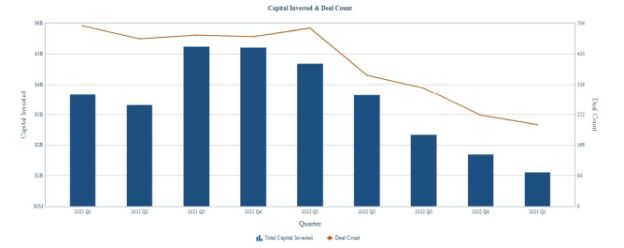Welcome to the March/April 2023 newsletter prepared by Arnold & Porter's AdTech and Digital Media group. This newsletter includes regulatory, judicial, legislative and marketplace developments relevant to the AdTech and Digital Media industries, and the state of venture activity in the AdTech and MarTech industries.
FTC Developments
FTC Orders to social media and video streaming platforms regarding surge in advertising for fraudulent products and scams. On March 16, 2023, the FTC issued a release announcing that it had issued orders to eight social media and video streaming platforms "seeking information on how these companies scrutinize and restrict paid commercial advertising that is deceptive or exposes consumers to fraudulent health-care products, financial scams, counterfeit and fake goods, or other fraud." According to the release, FTC data indicated that in 2022 alone, "consumers reported losing more than $1.2 billion to fraud that started on social media, more than any other contact method." The Orders state that the information is for purpose of an FTC study of the platforms' "policies, procedures, and practices to detect, prevent, and reduce deceptive Commercial Advertising and online shopping fraud, including the Platforms' maintenance and enforcement of advertising standards; verification and authentication of advertisers; screening for misleading, deceptive, and fraudulent ads; and use of disclosures and other techniques to ensure commercial messages are identifiable as advertising." The information elicited is for the period from January 1, 2019 onwards.
Litigation Developments
"Big Brother" cast member sues developer of app that swaps users' faces on celebrity bodies for violation of privacy rights. In Young v. NeoCortext, Inc., filed in federal court in the Central District of California on April 3, 2023, Kyland Young, a reality show celebrity, alleges that NeoCortext, the developer of the Reface app for smartphones, illegally profits off the publicity rights of actors, musicians, athletes, and other public figures without their consent. According to the complaint, "Reface is a deep-fake software that allows users to swap their faces with actors, musicians, athletes, celebrities, and other well-known individuals in scenes from popular shows, movies, and other short-form internet media." According to the complaint, users are induced to use the product through a free version of the app that generates watermarked face swaps. To generate non-watermarked face swaps, users must pay a fee of $5.99 per week, or $36.99 for life. The complaint makes clear that it is not challenging the legality of deep-fake technology, but is challenging a company's exploitation of "well-known Californians' names, voices, photographs and likenesses to pitch its product for profit." Specifically, the complaint alleges that defendant violated the California Right of Publicity Statute, which prohibits and provides statutory damages for the knowing misappropriation of an individual's name, voice, signature, photograph, or likeness in advertising or soliciting without the individual's prior consent.
Plaintiff Young brought the action on behalf of himself and the class defined as "All California residents whose name, voice, signature, photograph, or likeness was displayed on a Reface application Teaser Face Swap or the PRO Version of the Reface application on or after April 3, 2021." The complaint seeks injunctive relief, compensatory and punitive damages, and an award of attorneys' fees.
Caremark claim filed against Meta leaders for failure to prevent human trafficking on Meta's platforms. On March 20, 2023, institutional shareholders of Meta Platforms, Inc. ("Meta") filed a derivative suit in the Delaware Court of Chancery against directors and senior officers of Meta alleging breach of fiduciary duty for failure to act in good faith to exercise oversight over Meta's platforms, including Facebook and Instagram, and failure to prevent "sex trafficking, human trafficking and child sex exploitation" on the platforms. The lawsuit was filed on the back of a books and records demand, which the plaintiffs alleged showed a complete failure of the Meta board or any board committee to discuss the use of Meta's platforms for sex trafficking or human trafficking, despite "global awareness and concern" with these issues. The complaint rides the current wave of Caremark litigation alleging breach of fiduciary duty based on the failure of oversight, including its recent expansion to officers as defendants. The complaint alleges that immunity under Section 230 of the Communications Decency Act of 1996 is inapplicable due to the FOSTA-SESTA amendments. The complaint seeks damages, an order directing Meta to implement a board-level reporting and information system to address the trafficking and exploitation, and other equitable and injunctive relief.
Spate of school district lawsuits target social media companies. In January of this year, Seattle School District No. 1 filed a lawsuit against a number of large social media companies alleging that their products were intentionally designed to be addictive and harmful to America's youth and created and cultivated a youth mental health crisis, which resulted in increased demands on school districts for mental health services and other remedial action. The action was brought under the State of Washington Public Nuisance Law, RCW 7.48.010 et seq. Similar lawsuits were subsequently filed in other states, such as California, Florida, New Jersey, and Pennsylvania. In the Washington action, the plaintiffs cited spikes in mental health emergencies during school hours, increased anxiety and suicidal ideation, aggressive cyberbullying, and a multitude of "trends" that encourage students to perform potentially dangerous stunts that are posted on social media. The plaintiffs pointed to research that illustrates that social media companies exploit the same "neural circuitry" as drugs and gambling do, in an effort to keep children on their apps. The plaintiffs are asking courts to declare the social media companies' conduct a public nuisance and pay damages to fund remedial services in connection with the dangerous use of social media.
Legislative Update
Utah passes laws regulating social media to protect minors. In March of this year, Utah passed two laws regulating social media companies and platforms in order to protect minors (Utah residents under 18 years of age): Utah Social Media Regulation Act, contained within H.B. 311 ("HB 311"), and Social Media Regulation Amendments, S.B. 152 ("SB 152"). Social media companies are defined to include persons or entities that provide social media platforms with at least 5 million account holders worldwide.
HB 311 prohibits social media companies from "us[ing] a practice, design, or feature on the company's social media platform that the social media company knows, or which by the exercise of reasonable care should know, causes a Utah minor account holder to have an addiction to the social media platform." SB 152 requires social media companies to comply with a number of structural protections for Utah minors, including: (i) not permitting Utah minors to be account holders without the express consent of a parent or guardian, who must be given a password or other means to access the account; (ii) prohibiting direct messaging from other users who aren't linked through friending, displaying advertising, and the use of targeted or suggested groups or services; (iii) collecting or using certain personal information, and (iii) prohibiting Utah minor account holders from accessing their accounts between 10:30 p.m. and 6:30 a.m., subject to permitted account modifications.
The laws are administered and enforced by a Division of Consumer Protection, which is empowered to receive consumer complaints and audit the records of social media companies to determine compliance, investigate complaints, and commence judicial enforcement proceedings to pursue a broad range of monetary and nonmonetary remedies. Social media companies are subject to a civil penalty of $250,000 "for each practice, design or feature shown to have caused addiction," up to $2,500 for each Utah minor account holder shown to have been exposed to such practice, design or feature, and up to $2,500 for each violation of the SB 152 requirements described above. The laws also provide a private right of action, with remedies including reasonable attorney fees and court costs, $2,500 for each incident or violation, and actual damages for addiction, financial, physical, and emotional harm incurred by the person bringing the action. There is a rebuttable presumption of addiction harm for Utah minors under 16. The laws take effect on May 3, 2023, with certain provisions becoming effective on March 1, 2024. It will be interesting to see whether any social media companies decide to simply exclude Utah minors from their platforms.
EU Regulatory
AdTech in the EU regulatory crosshairs. A recent study commissioned from legal agency AWO by the EU executive's digital department on the impact of recent developments in digital advertising concludes that "the status quo is unsustainable for individuals, publishers, and advertisers" and concludes there is "a strong case to reform digital advertising." The study notes:
"[T]here is a need to improve transparency and accountability in the digital advertising ecosystem in three particular areas: ad spend and other B2B issues; the collection, use and dissemination of personal data; and environmental impacts. There is a need to increase individuals' control over how their personal data is used for digital advertising, including how they avoid unwanted targeting. There are also a number of obstacles that make it harder for advertisers and publishers to "know their audience" and communicate with them directly through advertising."
The study attributes problems to factors such as (1) the rapid growth in search advertising and social media advertising channels over the last 10 – 15 years, (2) the complexity caused by the large number of adtech intermediaries, (3) the reliance of digital advertising on large amounts of personal data and profiling of individuals, (4) the high energy consumption and emissions driven by data processing, (5) the lack of user friendly or crossplatform tools for users to control their data, and (6) the significantly greater access large platforms have to data, as compared to European publishers. Whether a reform initiative gains momentum in the run-up to the EU elections in May 2024 remains to be seen.
Other
Allegation that Global Alliance for Responsible Media and World Federation of Advertisers Violate Sherman Act. On March 22, 2023, the Chairman of the House Committee on the Judiciary, Representative Jim Jordan, sent a letter to the Global Alliance of Responsible Media ("GARM") and the World Federation of Advertisers ("WFA") alleging that the two organizations were "potentially violating U.S. antitrust law by coordinating their members' efforts to demonetize and eliminate disfavored content online." Based on information on its website, GARM is "a cross-industry initiative established by the World Federation of Advertisers to address the challenge of harmful content on digital media platforms and its monetization via advertising." WFA is a global marketing organization "representing 90% of global marketing communications spend – roughly US$900 billion per annum." The letter alleges (1) that GARM "coordinates agreements among its members to prevent certain content from benefitting from advertising dollars and to reduce the content's presence online;" (2) that GARM does this by designating categories of speech that are harmful, and then developing "suitability" levels within each category for social media companies to restrict the speech; and (3) that this is the type of collusive conduct that is prohibited under the Sherman Act. The letter requests certain documents and information to aid the Judiciary Committee in its investigation.
Meta Considers Building a New Decentralized Social Media Network. According to a Washington Post article, a spokeswoman for Meta stated on March 10, 2023 that the Facebook parent is exploring creating a decentralized text-based social media network where content "creators and public figures can share timely updates about their interests." If Meta were to move forward with such plans, it would be a giant following an existing path of decentralized social media platforms paved by predecessors like Bluesky (founded by former Twitter CEO Jack Dorsey) and Mastodon (which rose to fame in late 2022 when a number of users defected to Mastodon amidst Elon Musk's takeover of Twitter). While there are many flavors of decentralized platforms, a defining characteristic is that their backbone consists of many sites (i.e. servers or instances) instead of a single site controlled by a single company (like Twitter).
Report Highlights Ease of Buying Drugs Through Social Media Platforms and Other Online Sources. A report titled "Social Media, Fentanyl & Illegal Drug Sales: A Report from the Colorado Department of Law" released on March 8, 2023 by the Colorado Attorney General found that buying illicit substances online was "nearly as convenient as using one's phone to order a pizza or call an Uber." The report describes access to illegal drugs online as a "whole-of-Internet" challenge, but focuses on how drug dealers exploit features on social media platforms and dating apps to reach out to potential buyers. The report notes that "[t]he same built-in features that platforms use to enable legitimate commercial activity and social interactions between users—such as encrypted messaging, ephemeral content, and anonymous communications—are also exploited by drug sellers to market and sell illicit substances." While social media companies generally have policies prohibiting the use of their platforms to traffic illicit substances, the report concludes that "responses" from such companies are limited in effectiveness. The 182-page report urges social media companies to implement best practices, and advocates adoption of federal and state legislation to provide for greater oversight over social media companies, and greater funding to combat online distribution of drugs.
Markets
Based on data provided by PitchBook, both the aggregate capital invested and the deal count for venture investments in AdTech & MarTech has continued its downward trend in the U.S., from its peak in Q4 2021 (see figure 1 below). A similar pattern occurred for the U.S., Europe, and Asia combined (see figure 2 below).
(Figure 1: U.S. Only)

(Figure 2: U.S., Europe, Asia)

The content of this article is intended to provide a general guide to the subject matter. Specialist advice should be sought about your specific circumstances.







